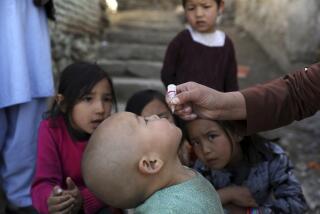Threat of a Different Disease
Refugee camps near Afghanistan, now being sought out by hundreds of thousands of people fleeing the war, are in danger of becoming giant petri dishes for the spread of a highly contagious and potentially deadly disease: tuberculosis.
Last year in the United States, TB was at an all-time low, infecting 16,377 people, all but a few of whom were cured. Last year in impoverished nations, however, the ancient scourge killed more than 2million people.
Afghanistan has the second-highest TB rate of 23 eastern Mediterranean nations surveyed by the World Health Organization. It is one reason why 257 out of 1,000 Afghan children die before reaching age 5, compared with five out of 1,000 in the U.S. Because just one person with active, untreated TB can infect 10 to 15 others a year, the refugee camps have become “time bombs,” officials say.
WHO should move immediately to set up emergency TB eradication programs in the camps, and developed nations should help provide the estimated $4million the program would cost.
According to the World Bank, the Pakistani government, citing lack of funding, has recently scaled back its own successful efforts to stop TB, and additional funding would also be needed to keep these efforts going. TB causes 25% of all Pakistani deaths each year.
To combat this growing global threat in the longer term, Congress should support a petition being circulated by Patrick Leahy (D-Vt.) in the Senate and by James Leach (R-Iowa) in the House calling on President Bush to set aside $1billion over five years for a new “global fund” established by WHO and the World Bank to treat and contain TB, as well as AIDS and malaria.
At a House hearing scheduled for Thursday on U.S. aid to Afghanistan, legislators should press Andrew Natsios, head of the U.S. Agency for International Development, for a response to the Leahy-Leach effort.
The new fund’s model should be the Global Alliance for Vaccines and Immunizations, initiated by the Bill and Melinda Gates Foundation. This effective program requires that health agencies document each successful course of treatment. Third World health workers get $10 to administer a six-month course of TB medications, for example, and another $10 only when they document that the person is cured.
A billion dollars may seem like a lot of money, but as billionaire financier George Soros pointed out at a news conference on the TB epidemic last week, the United States currently devotes less than one-tenth of 1% of its gross domestic product to foreign aid, down from 1% in the early 1960s. Other industrialized nations give twice the U.S. amount.
As a new World Bank report points out, infectious diseases are increasingly trapping poor nations “in a vicious cycle of disease and impoverishment,” unable build a stable working class. TB alone, the World Bank estimates, costs $12billion in lost income each year.
Preventing the spread of the deadliest infectious diseases is more than a moral imperative. It is a practical necessity, both for Third World economic development and for prevention of new global epidemics.
More to Read
Sign up for Essential California
The most important California stories and recommendations in your inbox every morning.
You may occasionally receive promotional content from the Los Angeles Times.










